Welcome to the February 2022 issue of the Global Washington newsletter.
IN THIS ISSUE
- Letter from our Executive Director
- Issue Brief: If We Do Not Invest in SDG 16 We Risk Conflict and Sliding Back on All of the Other Goals
- Organization Profile: OutRight International: Strengthening Institutions and Reducing Inequalities by Advocating for LGBTIQ Rights Around the World
- Goalmaker: Goalmaker: Adriana Beltrán, Executive Director, Seattle International Foundation (SIF)
- Welcome New Members
- GlobalWA Member Events
- Career Center
Letter from our Executive Director
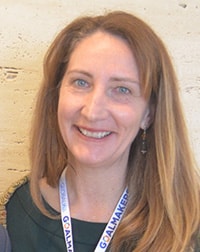
When the Sustainable Development Goals (SDGs) were established in 2015, the global development community acknowledged the fundamental need to have highly functioning government institutions that support the well-being of people and communities. In fact, experts now believe that SDG 16, which focuses on peace, justice, and strong institutions, is the very backbone of all other goals, and without it, the other goals will not be achieved.
Good governance is often overlooked because it is more evident when a government is not working. Recent events in Myanmar, Ethiopia, and Afghanistan are examples when an internal political crisis resulted in a humanitarian crisis for its citizens. In Afghanistan, nearly 68% of the population is experiencing food insecurity, and in Ethiopia, over 5.2 million people are in need of emergency food aid.
This month, we feature Global Washington members who are working to support SDG 16 within low and middle income countries to ensure peace, stability, and a civil society that supports the most vulnerable. This topic was referenced numerous times at our annual conference last December in light of President Biden’s Summit for Democracy. A summary of sessions addressing SDG 16, the role of governments to support gender equality, as well as all other sessions are included in our Goalmakers Conference Report.
We’ve also been tracking humanitarian crises unfolding over the past few years and encourage you to read our updated action alerts to learn more and support the organizations listed.
Global Washington hopes to host in-person events in the near future to bring our community together around critical topics such as SDG16. Check our event page on our website soon for future listings.

Kristen Dailey
Executive Director
Issue Brief
If We Do Not Invest in SDG 16 We Risk Conflict and Sliding Back on All of the Other Goals
By Joanne Lu
In December, the Biden Administration closed out 2021 by sounding an alarm: Democracy is under threat around the world. If the world does not work to defend it, the president warned at his first Summit for Democracy, we will not be able to rise to the unprecedented challenges of our time.
Joe Biden is not the only one who feels that way. There is growing consensus among global leaders who are working toward the Sustainable Development Goals (SDGs) that if we, as a global community, do not invest in SDG 16 – peace, justice and strong institutions – we risk conflict and sliding back on all of the other goals.
On the first day of Global Washington’s Goalmakers 2021 conference, on December 8, leaders from our community gathered online to discuss this very issue.
“When the system itself is unjust or unequal, you cannot maintain your precious development gains – you almost always plant the seeds for greater conflict [or] renewed violence,” Nancy Lindborg, President and CEO of the David and Lucile Packard Foundation, said in a panel discussion.
Laura Chinchilla, Costa Rica’s first woman president, agreed: “The purpose is not to build institutions for the sake of them. On the contrary, we are guided by higher principles and goals to which those institutions are meant to serve. This is why I consider SDG 16 the moral backbone of the 2030 agenda.”
SDG 16 is summed up as “peace, justice and strong institutions,” but the panelists warned about the pitfalls of this “bumper sticker” abbreviation.
“[Strong institutions] is a phrase that is open to misunderstanding and misuse,” said Betsy Anderson, executive director of the World Justice Project. “Institutions that are powerful, even authoritarian…, could be characterized as strong, and, of course, that’s not what we contemplate in SDG 16.”
Instead, Anderson says, we should look at the full text of the goal that UN member states signed onto: “Promote peaceful and inclusive societies for sustainable development, provide access to justice for all and build effective, accountable and inclusive institutions at all levels.”
Anti-corruption – one of the three focuses of the first Summit for Democracy, along with human rights and the rise in authoritarianism – is a key part of building effective, accountable and inclusive institutions. This is something the Chandler Foundation has been working hard to promote through its investments. For example, they support organizations like Open Government Partnership, which provides government officials and their partners with practical tools and resources – including more than 200 crowdsourced examples of policies and practices – that help keep governments transparent and honest. Similarly, Open Contracting Partnership helps governments adopt protocols for buying emergency equipment quickly and fairly, without favoritism, allowing government funds to stretch further.
Renewing Democracy – A Decade of OGP | Video: Open Government Partnership
The Chandler Foundation also helped launch the Chandler Sessions on Integrity and Corruption at Oxford University as an opportunity for government anti-corruption leaders to engage in peer exchange and learning.
Of course, data is also critical for governments and advocates to assess how well they’re doing. That’s why the World Justice Project publishes its Rule of Law Index every year. Through household surveys and interviews with experts, the index measures how rule of law is experienced and perceived throughout the world, and it’s shared across sectors with the intention to “encourage policy reforms, guide program development and inform research to strengthen the rule of law.”
Here again is a term that has been misused to justify authoritarian regimes and brutal crackdowns – what WJP executive director Betsy Anderson says is more like “rule by law.” Instead, she says, under the rule of law, “a strong institution does enforce laws and holds people accountable, but it also is accountable itself under the law. The law has to be clear, publicized, stable, and uphold human rights. And the processes by which that law is adopted and administered should be open and accessible.”
Such a system not only facilitates the achievement of all the other SDGs, but it also ensures that progress is inclusive and leaves no one behind. As Nancy Lindborg of the David and Lucile Packard Foundation mentioned above, effective, inclusive, and accountable institutions are also critical for maintaining peace.
We’ve seen, for example, how quickly Afghanistan fell to the Taliban as soon as the U.S. withdrew, in large part because corruption had undermined Afghanistan’s ability to develop effective institutions. The government of Afghanistan wasn’t able to create credibility, says Lindborg, and the people lacked confidence in it.
But as we also see in Ethiopia, when conflict breaks out, decades of progress can be reversed seemingly overnight. The World Bank estimates that by 2030, two-thirds of the world’s poorest people will live in conflict zones. That’s why humanitarian and development organizations like Mercy Corps not only respond to crises after they break out, but also facilitate peacebuilding. For example, in Nigeria, where climate change is driving conflict between farmers and pastoralists, Mercy Corps is helping these groups build trust in each through dialogue, mediation, and working together to address common problems.
Similarly, in 2019, the U.S. signed into law the Global Fragility Act, which aims to take a more proactive, long-term, whole-of-government approach “to help countries move from fragility to stability and from conflict to peace.” The bill includes for the first five years $200 million a year for a Prevention and Stabilization Fund and $30 million a year for a Complex Crisis Fund. It also requires 10-year strategies for five priority countries or regions.
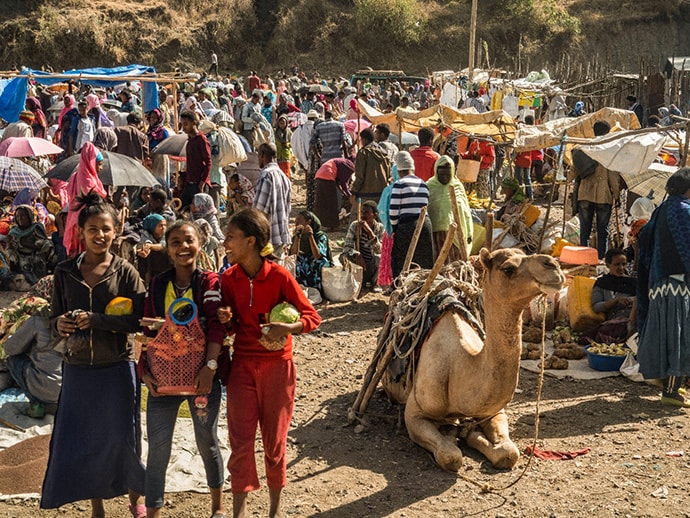
Crowded market in Ethiopia. Photo: Lesly Derksen, Unsplash
Amid a rise in global conflicts after decades of decline and other unprecedented challenges – like the pandemic and climate change – that are only exacerbating violence, efforts to promote peace, justice, and effective, inclusive, and accountable institutions are more important than ever. It may be the last Sustainable Development Goal, but it is foundational to maintaining – and accelerating – all of the progress we’ve worked so hard for as a global community.
The following GlobalWA members are working to build strong institutions and reduce inequalities in low and middle income countries.
The Chandler Foundation’s mission is to help build strong and healthy nations that provide all people the opportunity to unleash their creative and entrepreneurial potential. We believe that governments, when operating in service of their citizens, are the most effective accelerators of change. So, the Chandler Foundation invests in organizations working to reduce corruption and bolster public service capacities of governments in the Global South. We partner with organizations like Open Government Partnership, Open Contracting Partnership, and Chandler Institute of Governance. We also launched the Chandler Sessions on Integrity and Corruption at Oxford University to promote peer exchange among anti-corruption leaders from governments around the world.
We believe that talent is equally distributed, but opportunity is not. Rather than adopting a traditional model of “alleviating poverty,” the Chandler Foundation seeks to build the enabling conditions for upwards social mobility. We are currently developing this new area of work and are exploring the intersection between social mobility and inequality.
Landesa champions and works to secure land rights for millions of those living in poverty worldwide to promote social justice and provide opportunity. Deeply entrenched inequalities around gender, age, and Indigeneity reinforce the poverty cycle, but land provides firm ground to stand on. Secure rights to land lay the foundation for people to access other basic rights.
Landesa partners directly with governments to strengthen the institutions that develop and implement land laws. When land ownership is unclear, the potential for violence and conflict escalates in cases of migration and natural resource use. Secure and transparent land rights act as pillars of peace at the household, community, and national levels.
Landesa provides ongoing technical assistance to the Liberian government as it implements the national Land Rights Law passed in 2018. This includes supporting the Liberia Land Authority to develop legal and institutional frameworks that promote inclusion of women and youth, along with gender-responsive policies and regulations to enhance implementation. A focus on national and county government capacity building offers training opportunities for young Liberians and ensures gender-responsive land reform can continue successfully into the future. Beyond government partnership, Landesa also builds capacity of civil society groups to raise legal awareness and foster implementation of the Land Rights Law that is responsive to climate change, gender, and youth. Learn more about Landesa’s work in Liberia.
Oxfam America is a global organization that fights inequality to end poverty and injustice. We offer lifesaving support in times of crisis and advocate for economic justice, gender equality, and climate action.
We seek to reduce inequalities and promote peaceful and inclusive societies throughout our work. Our Commitment to Reducing Inequality Index ranks 158 governments according to their social spending, tax and labor policies to fight economic inequality. In many of these countries we work with partners to hold government accountable for progress in these areas. In doing so we defend the ability of people to organize and speak out without fear by strengthening partners’ resilience and effectiveness, building political support for freedoms of speech and association, and advocating for protections of partners under threat. Globally, we advocate for resource transfers from rich to poor countries. We tell truth to power in our annual reports around the global elite’s Davos meetings, including by challenging corporate power. We also work collaboratively with governments committed to just and inclusive societies, notably through Pathfinders for Peaceful, Just and Inclusive Societies, a multi-stakeholder initiative that seeks to accelerate action at the intersection of SDG16 and SDG10 through research and dialogue.
Pangea Giving works to be a catalyst for peace, social, and economic justice. As a giving circle, we share our time and resources to form trusting relationships that impact change around the world. Three key steps we take are:
- Listening deeply to our partners in order to strengthen our understanding of their experiences and the injustices they face
- Taking responsibility for educating ourselves about critical topics such as global climate change, indigenous peoples’ rights or gender-based violence
- Taking action to support our partners to reach their goals through funding, networking and technical assistance
Central to Pangea’s mission is the commitment that our grants fund the self-defined needs of communities. We work with grassroots organizations that are embedded in communities and engaged in work that addresses their needs. We do not limit our support to any particular issue; however, most of our work is focused on four pillars: climate and environmental justice, gender equity, children’s rights and education, and indigenous rights.
We believe that establishing transparent and supportive relationships with our partners, and continuously learning from our interactions, are essential to making lasting impact.
Seattle International Foundation (SIF) is guided by a vision of just, peaceful, and prosperous societies in Central America. From our 14-plus years working in the region, we recognize that the foundational pillars of strong societies are championing good governance and strong rule of law, supporting a vibrant civil society, fostering equity and inclusion, and addressing the root causes of migration and displacement. We support and strengthen local civil society actors who understand their communities and countries best, and are the frontline in the fight against corruption, impunity, inequality, and human rights violations.
SIF makes financial grants and provides technical support to civil society actors, including independent media outlets, youth social movements, activists, and other organized civil society members. To complement our grantmaking, we intentionally create spaces for actors across the region to convene securely and build supportive peer networks; advocate and amplify issues in Central America to US policymakers and in broader public stages; and engage philanthropic donors interested in Central America to encourage investment. We believe that these approaches, combined with the sustained efforts of civil society in Central America, are the best way forward, especially in this politically and economically challenging era.
Spreeha transforms lives by empowering people in communities to thrive through healthcare, education, skills training, and economic opportunities. Spreeha envisions people empowered to permanently break the cycle of poverty. We deeply engage with communities to build trust and understand the problems they face. Spreeha’s work as an institution builds on its core values of empathy, innovation, agility, continuous learning, partnership and integrity.
In Bangladesh, through a holistic approach of healthcare, education, sills training and economic opportunities, Spreeha empowers children, women and men in the underserved communities. Spreeha’s healthcare and telehealth services offer access to healthcare for communities in urban slums and remote areas. This especially provides access to healthcare for pregnant women. Preschools program introduces learning at an early age, and provides a level playing field for children living in urban slums. After-school program helps students to succeed and prevents school dropouts, a common concern for slum area students. The adolescent girls’ club and leadership programs for teenage girls and boys empower adolescent students with leadership skills, social justice, civic responsibilities and individual rights. The work of providing access and opportunities empowers communities, creates a lasting impact, breaks the cycle of poverty, and reduces inequalities.
Sukarya is a woman led, women centric and women focused organization, and has been strongly advocating for women empowerment and place them at the center of the development curve, equipping them with education, life-skills, training and career opportunities since last two decades.
Be it Education on Wheels, skilling of women, leadership training of adolescent girls or providing maternal and child health services are designed keeping in mind their intergenerational challenges. It works with women at individual/group level to build their self-esteem and self-worth. By providing education, life skills, awareness about their body, surroundings and rights, countless women have learnt to tackle complex emergency situations. We stand by our communities and this came into play most impactfully during COVID-19 pandemic.
Through the two years of COVID-19, handholding support, reassurance and guidance have been provided to families ravaged by the pandemic. By creating awareness, providing timely relief, addressing daily needs with COVID-19 hygiene kits and food packets with dry rations, Sukarya has also been consistent in its advocacy for vaccines, ensuring families are fully vaccinated. From printing advocacy materials to organizing trainings (online and offline), making household visits and WhatsApp groups, and encouraging and shaping community leaders, not a single day passes when Sukarya team is not there for its communities.
At the core of Sukarya’s work is to help build resilient communities that can weather all storms and upheavals, boost PPP initiatives and NGO sector at grassroots to help existing government programs scale-up ensuring voices of minorities, especially women and adolescent girls, find a place in the larger public dialogue and policy framework.
Women’s Link Worldwide is a transnational feminist organization that uses the power of the law to advance the human rights of women and girls. We use the law creatively to help judges understand the problems women are facing and issue decisions that contribute to reducing the inequality women experience. Our focus in on advancing access to sexual and reproductive health services and protection when women are victims of gender-based violence.
The strategic legal actions Women’s Link undertakes have the potential for broad impact, not only for the women we represent, but also for the communities in which they live. For example, in response to our lawsuit, a court in Colombia recently ordered that various health authorities take immediate measures to protect the sexual and reproductive health of women in Norte de Santander (which borders Venezuela), including migrant women.
In another legal action with allies in Guatemala, we called on judicial authorities to guarantee rights in the midst of the pandemic. The authorities adopted our recommendations to extend operating hours of courts that deal with violence again women, extend protection measures for women who are victims of violence, and called for a protocol for the functioning of the judiciary in the current crisis.
Our work strengthens institutions by providing the judiciary with opportunities to issue rulings with a gender perspective that in turn help authorities and governments guarantee women and girls their rights to live free from violence and discrimination and to have full autonomy over their bodies and their decisions.
The World Justice Project is an independent, multidisciplinary organization working to advance the rule of law around the world. Effective rule of law reduces corruption, combats poverty and disease, and protects people from injustices large and small.
The World Justice Project’s research and analysis includes the annual World Justice Project Rule of Law Index®, the world’s leading source for original data on the rule of law. The 2021 Index draws on more than 140,000 in-depth household and expert surveys to measure rule of law in 139 countries and jurisdictions around the world.
In its role as convener of the international, multi-stakeholder rule of law movement, the World Justice Project and its partners will host World Justice Forum 2022: Building More Just Communities in the Hague and online, May 30 – June 2, 2022.
Yemen Relief and Reconstruction Foundation Yemen has been at war since 2015. The Yemen Relief and Reconstruction Foundation (YRRF) has been involved in life saving relief efforts throughout the country. Disastrous blockades of lifeline ports coupled with indiscriminate continuous bombing campaigns have produced an historically unprecedented humanitarian crisis with extreme food insecurity and a destruction of many of the services, including health and education. The Foundation has been critical in providing food, medicines, and other aid. YRRF supported activities related to COVID19 response to health facilities and the major public health laboratories. Moreover, YRRF continues to provide much needed medicine, equipment, and supplies to public health facilities, supports schools and students, focusing on the vulnerable and underserved populations, and supports families with income generation projects to facilitate their independence. We reduce inequalities by delivering our services to remote, hard to reach villages across the rugged geography. We emphasize the disenfranchised including the internally displaced persons sheltering in camps. We also partner with other organizations to advocate for peace and to end US support to the war. Our vision is Peace for the people of Yemen and the preservation of their institutions to allow them to enjoy the security and well-being currently beyond their reach
Organization Profile
OutRight International: Strengthening Institutions and Reducing Inequalities by Advocating for LGBTIQ Rights Around the World
By Joanne Lu
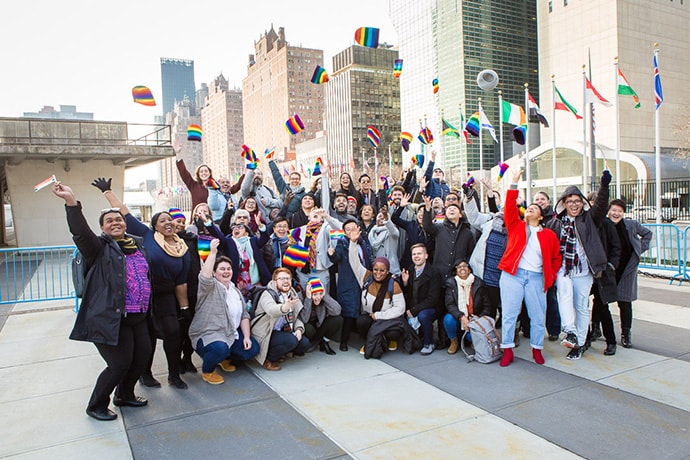
OutSummit 2018 | Photo: OutRight Action International
The Sustainable Development Goals are on a mission to “leave no one behind.” But that will not be possible without the inclusion of one of the most historically marginalized and abused communities – lesbian, gay, bisexual, transgender, intersex and queer (LGBTIQ) people.
That’s why since 1990, OutRight Action International has been advocating for the rights and protection of LGBTIQ people around the world, from grassroots civil society to the United Nations.
“Everywhere in the world, LGBTIQ people continue to be denied human rights. OutRight wants to change that,” says Neela Ghoshal, OutRight’s Senior Director of Law, Policy and Research. And over the last 30 years, they have facilitated many victories – huge and incremental – for LGBTIQ people.
Founded in 1990 by Julie Dorf, OutRight – which was then called the International Gay and Lesbian Human Rights Commission (IGLHRC) – was initially focused primarily on Russia. They advocated for ending the psychiatric hospitalization of LGBTIQ people, access to HIV prevention and treatment and the decriminalization of same-sex relations, which was achieved three years later.
But the geographic focus on Russia didn’t last long. In 1993, they won the first sexual orientation asylum case in the U.S. for a Brazilian man, after presenting documentation showing that more than 1,200 LGBT people had been murdered in Brazil over a decade. And they persuaded the U.S. State Department to include the persecution of LGBT people in its annual country reports on human rights.
Two years later, they were a “very active participant,” says Ghoshal, in the U.N. Fourth World Conference on Women in Beijing, where they ensured that sexual rights were included in official discussions. Ghoshal says it was a “definitive moment in the defining of a global LGBT movement.”
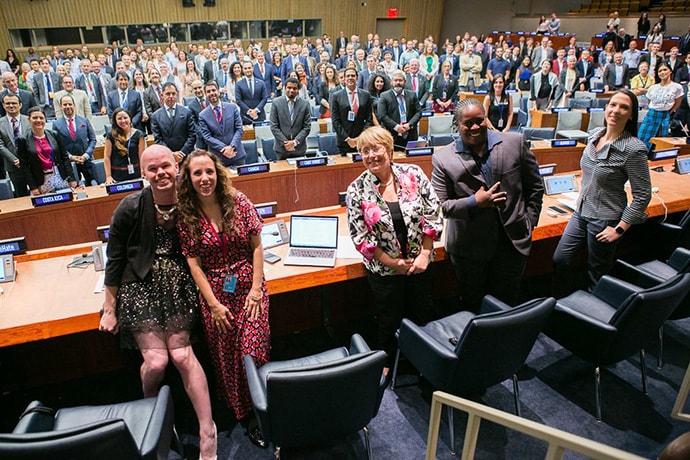
2019 UN LGBTI Core Group High-Level Meeting. Photo: Brad Hamilton
With some other victories along the way, IGLHRC became the only U.S.-based LGBTIQ organization to earn a year-round, permanent consultative status from the UN Economic and Social Council in 2010. This continues to be a massive platform for the organization to advocate for LGBTIQ equality at the UN, participate in proceedings, and bring together activists and policymakers from around the world.
Since then, the organization, which changed its name to OutRight Action International in 2015, has been supporting LGBTIQ movements all around the world, conducting research and advocacy and working to change the legal, political and social status of LGBTIQ people everywhere.
According to Ghoshal, who joined OutRight four months ago after 14 years at Human Rights Watch, what stands out about OutRight is its reputation for being a “dynamic and impactful organization.” This comes from not only the breadth of its work – spanning advocacy, research, training, grants, legal strategy and more – but also the depth of it, from partnering closely with grassroots civil society organizations to advocacy in the highest spaces of the UN.
“Right now, our work focuses in four regions: the Caribbean, sub-Saharan Africa, the Middle East and North Africa, and Asia,” says Ghoshal. “Everything that we do in those regions is in deep consultation with civil society organizations.”
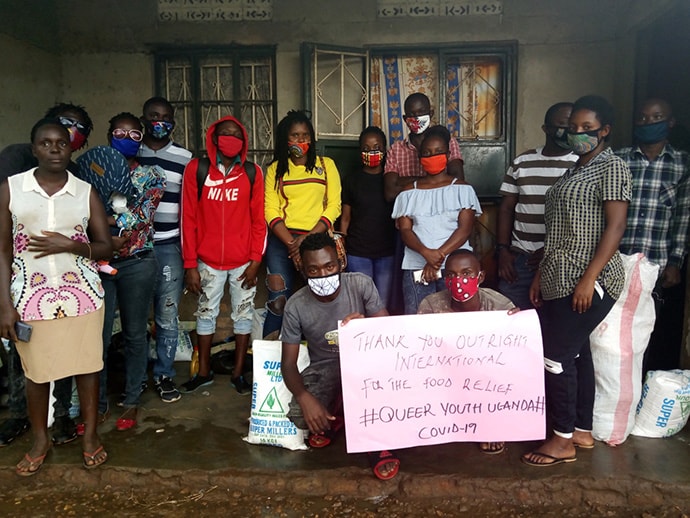
OutRight COVID-19 Global Emergency fund grantees 2021 | Photo credit: Queer Youth Uganda
Their reach, says Ghoshal, helps to amplify the voices of people who typically aren’t represented in higher-level decision-making spaces. And, it can help make sure that decisions being made in global institutions actually reflect the needs of LGBTIQ people everywhere.
Those needs are still immense, as LGBTIQ people are persecuted, excluded and not protected as equal citizens under the law. For instance in at least 68 countries, consensual same-sex relations are still criminalized and in a handful of others, gender expression is criminalized as well. Ghana, for example, is considering a law that will not only enhance criminalization of same-sex relations, but also criminalize advocacy for LGBTIQ equality.
But even in such hostile environments, there’s a lot that OutRight can do, starting with supporting grassroots and national-level organizations, dialoguing with governments about changing the laws and documenting the consequences of them. Like in Ghana, OutRight is documenting how violence has increased measurably since the discriminatory law was proposed – and it hasn’t even passed yet. Some politicians in the Ghanaian government find that evidence compelling, and they are using that information to resist the law.
Documentation is also critical for building international pressure and raising awareness of emergencies, like in conflict situations, where LGBTIQ people are disproportionately denied assistance, targeted with physical and sexual violence and enforced disappearances, and often lack the protection of their families and communities. In Afghanistan, for example, the Taliban has taken a hard stance against the rights of LGBTIQ people. Officials abusing their power are taking it out on women and LGBTIQ people. And LGBTIQ people are being turned into the Taliban by family members and neighbors who are trying to protect themselves.
But it’s not just conflict zones that are dangerous for LGBTIQ people.
“For LGBTIQ people even who are not living in situations of conflict, we are also typically not living in situations of peace,” says Ghoshal. “There’s the daily risk of violence [against LGBTIQ people] in many parts of the world on the basis of their identity.”
That’s why throughout Asia, OutRight is working with organizations that are seeking to make laws on gender-based violence more inclusive, so that LGBTIQ people have access to justice if they are abused by their intimate partners, their families or their neighbors.
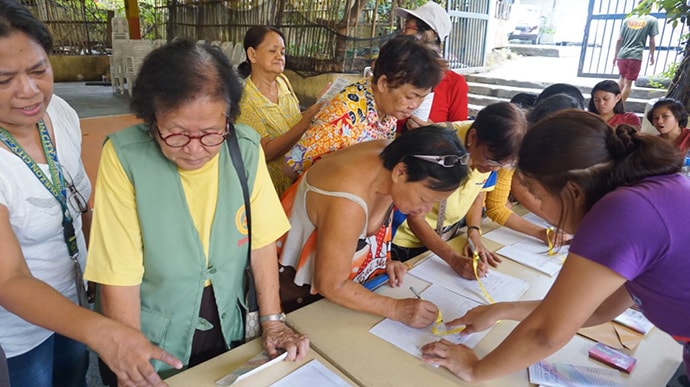
Workshop in the Philippines on Enhancing Domestic Violence Protections for LGBT – 2018 | Photo: OutRight Action International
“Essentially what we’re doing in all these countries is figuring out where the space is for incremental change – knowing that major change doesn’t always happen overnight,” says Ghoshal, “and working in partnership with civil society to get that incremental change done so that little by little, people’s lives get concretely better.”
Improving the lives of LGBTIQ people should be a top priority for the international community, because sustainable development is impossible when a portion of society is excluded, says Ghoshal. She would argue that nowhere in the world are institutions fully inclusive of LGBTIQ people yet. Even the Sustainable Development Goals themselves do not explicitly mention sexual orientation or gender identity.
But a society isn’t truly living freely, she says, if people are constantly afraid that the rights of one group or another are being trampled. Plus, Ghoshal adds, it’s often the case that when governments begin violating the rights of people based on their sexual orientation, gender identity or sex characteristics, attacks on the rights of other groups follow. This means that everybody should be concerned when they see an increase in attacks on LGBTIQ people.
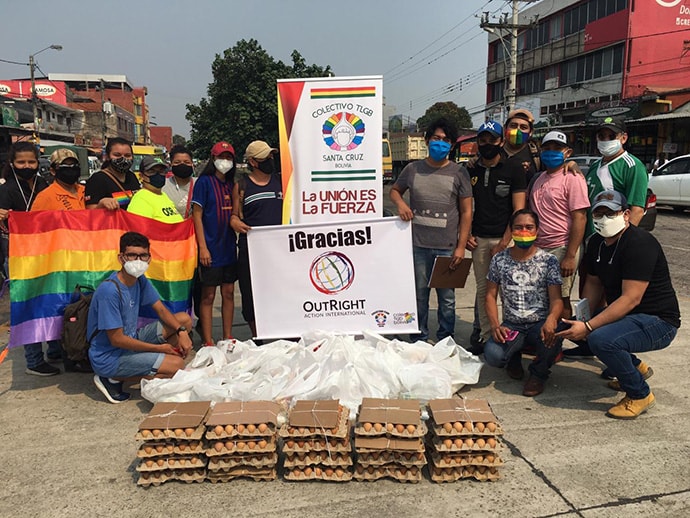
OutRight COVID-19 Global Emergency fund grantees 2021| Photo: LGBT Collective of Bolivia
On the other hand, if a government upholds even the basic human rights of LGBTIQ people, Ghoshal says it’s often a good indicator of that government’s willingness to accept and celebrate everybody living freely as who they are – regardless of their religion, disabilities or other characteristics.
“And that’s something that benefits everyone,” says Ghoshal.
Goalmaker
Goalmaker: Adriana Beltrán, Executive Director, Seattle International Foundation (SIF)
By Joanne Lu
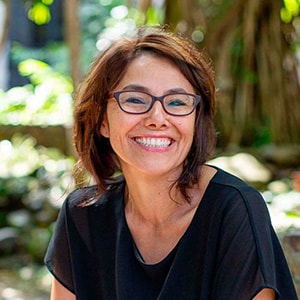 Bogotá, Colombia in the 1980s and ‘90s was not an easy place to grow up. But for Adriana Beltrán, the conflict, violence and disappearances that peppered her formative years set her on a path to where she is today, as the new executive director of Seattle International Foundation (SIF), where she continues a career dedicated to supporting anti-corruption, democracy and human rights in Latin America.
Bogotá, Colombia in the 1980s and ‘90s was not an easy place to grow up. But for Adriana Beltrán, the conflict, violence and disappearances that peppered her formative years set her on a path to where she is today, as the new executive director of Seattle International Foundation (SIF), where she continues a career dedicated to supporting anti-corruption, democracy and human rights in Latin America.
The political conflict between the government of Colombia, far-right paramilitary groups, and leftist guerilla groups began in the 1960s. But Beltrán vividly remembers when Colombia also became the epicenter of the War on Drugs. She remembers daily news of killings and disappearances, bomb drills at her school, and a period of time when a number of politicians, journalists, even comedians, were killed to silence their work.
Then, the violence and corruption hit too close to home.
Beltrán was in her early teens when her own father was disappeared. Shortly after, the people believed to be responsible for his disappearance began to threaten her family and go after their property and belongings. The suspects used their influence and money to pay off judges, police and bribe or coerce public officials to falsify and change land registry records.
“For me, it was a wake up call to the impact of impunity and corruption,” says Beltrán. “Watching my mom have to face that situation and confront a corrupt system that denied her access to justice probably had the most profound impact on my life and my decision to pursue a career in human rights.”
All this tension and conflict was a lot for a young teenager to take on, so Beltrán looked for a way out. It turns out that Loras College in Dubuque, Iowa granted two scholarships a year to students from Beltrán’s school in Colombia. So, she applied.
Beltrán was only supposed to be at Loras College for one year. But it was the first time in her life she was able to finally breathe and reflect on what she had gone through at home. Having that space to process and speak about her experiences ignited in her the desire to dedicate her professional career to advancing the rule of law and human rights.
After college, Beltrán moved to D.C., where she soon began a long career at the Washington Office on Latin America (WOLA), eventually becoming the Director for Citizen Security. At WOLA, she got to work with civil society organizations on a broad range of issues, including security and justice reform, democracy building, and gender-based violence.
One of the projects she’s most proud of from her time at WOLA was the creation of the International Commission against Impunity in Guatemala (CICIG), a UN-led anti-corruption body charged with helping local authorities investigate and prosecute illicit groups and their ties to the State. It was a proposal spearheaded by Guatemalan civil society organizations, who saw the need for international support in advancing rule of law because their own state institutions were being controlled by illegal armed groups that had emerged from the Guatemalan Civil War. The civil society groups approached WOLA to help them advocate with international donors for the creation of the commission, and after several years of tremendous coordination across continents, research and analysis, navigating security threats against those involved and major setbacks, the commission was finally founded in 2006.
According to Beltrán, the commission not only strengthened the capacity of local investigators, but it also shed light on how deeply entrenched systemic corruption is in Guatemala.
“More than anything, it gave hope to Guatemalans that the system could work,” says Beltrán.
But as Newton’s Third Law warns, for every action, there is an equal and opposite reaction. In Guatemala, those whose power and impunity were being threatened by the commission were not going to stand by idly. In 2019, the Guatemalan government shut down the commission, and according to Beltrán, at least 13 independent judges and prosecutors have been forced into exile. Others who are pushing for justice and greater accountability, including civil society actors and journalists, are also facing increasing attacks, malicious lawsuits, and defamation campaigns.
This powerful backlash against successful anti-corruption efforts and better governance is not just in Guatemala, says Beltrán – it’s happening across Central America. On top of that, the region has been devastated recently by several natural disasters, including two back-to-back hurricanes. And its institutions, including health and education systems, are still reeling from the impacts of COVID-19. These are some of the factors forcing Central Americans to make the tough decision to abandon their homes and migrate in search of security and a better life, says Beltrán.
While the Biden administration has refocused attention on the drivers of migration from the region and committed billions of dollars to it, Beltrán says that until the root issues of systemic corruption and impunity are addressed, we’re not going to see advances in other areas.
“Impunity is one the main threats to democracy in the region,” says Beltrán. “It is the ultimate expression of inequality enabling economic and political elites to undermine public institutions, distort justice, and violate people’s basic human rights.”
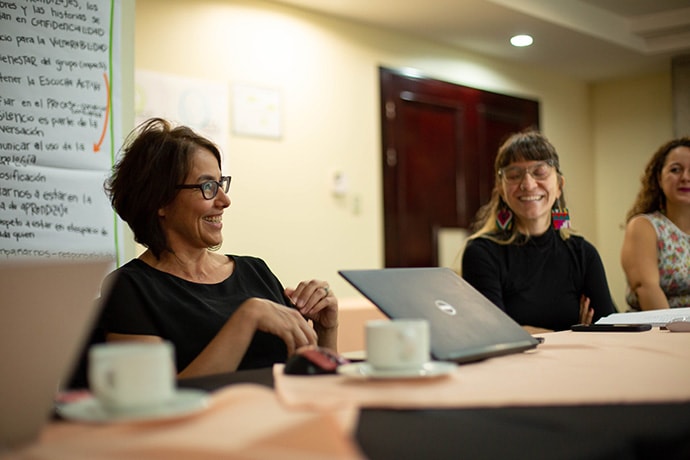
Photo credit: Seattle International Foundation
But there is a vibrant, courageous, and resilient civil society in Central America that continues to press for reforms, says Beltrán. And that’s what she is working to support in her new role at SIF, since September 2021.
Her relationship with the foundation actually goes back many years. While at WOLA, she worked with SIF, its co-founders Bill and Paula Clapp and many of its current and former staff on several initiatives. As a long-time admirer of SIF’s work in Central America, Beltrán says she “just knew” she wanted to lead the foundation as executive director when the position was announced.
“It felt like a natural, perfect fit, given our shared values and commitment to the region,” says Beltrán.
She’s excited to guide the foundation in its next chapter of growth and to strengthen SIF in its role as a leading partner in supporting civil society efforts to advance rule of law, good governance, and equity in Central America. In addition to grantmaking, the foundation is amplifying the voices of civil society leaders; helping them gain access to US policymakers; strengthening their skills, capacity, and networks; advocating for more philanthropic support and investment in the region; making sure they have flexible, multi-year funding to respond to emergencies; and much more.
The region is facing a very difficult period at the moment, says Beltrán, but “SIF is no stranger to tough times.” And neither is she.
Welcome New Members
Please welcome our newest Global Washington members. Take a moment to familiarize yourself with their work and consider opportunities for support and collaboration!
Operation Snow Leopard
Operation Snow Leopard has established an optimized network of Strategic Partners to support Proven Enablers to bring home from Afghanistan every US Citizen and Legal Permanent Resident (LPR), the immediate and extended family members of US citizen and LPRs, and our Afghan allies and partners who served the United States Armed Services faithfully as Afghan special operations, interpreters, security specialists, and intelligence analysts. The situation in Afghanistan is dire and their lives are in our hands, thus we will honor the promise our nation made to protect them. operationsnowleopard.org
Member Events
March 4, 6:30pm PST: Upaya Social Ventures Gala (In-Person and Virtual)
March 19, 10am PST: International Women’s Day Virtual Speed Mentorship Event
March 26, 5:30pm PST: Maximize Life Gala (In-Person)
April 8 – April 10: Opportunity International: 50th Anniversary Summit
Career Center
Assistant, Global Operations & Development, VillageReach
Development and Communications Associate, FSC Investments and Partnerships (FSC I&P)
Credit Operations Officer, Global Partnerships
Operations and Development Manager, Future of Fish
Seafood Program Director, Future of Fish
Check out the GlobalWA Job Board for the latest openings.